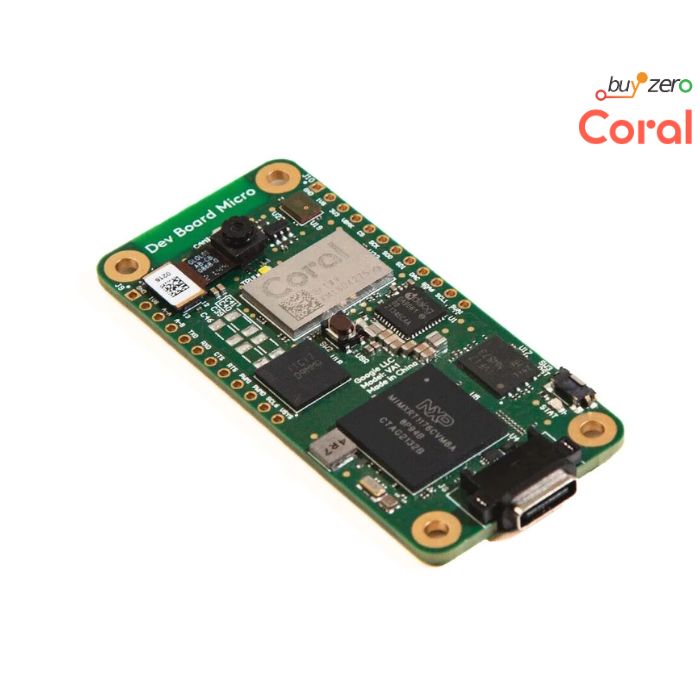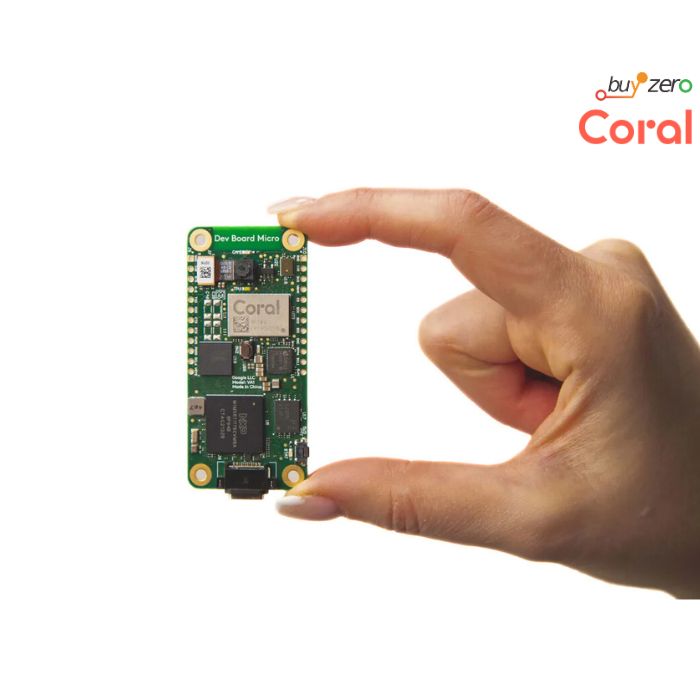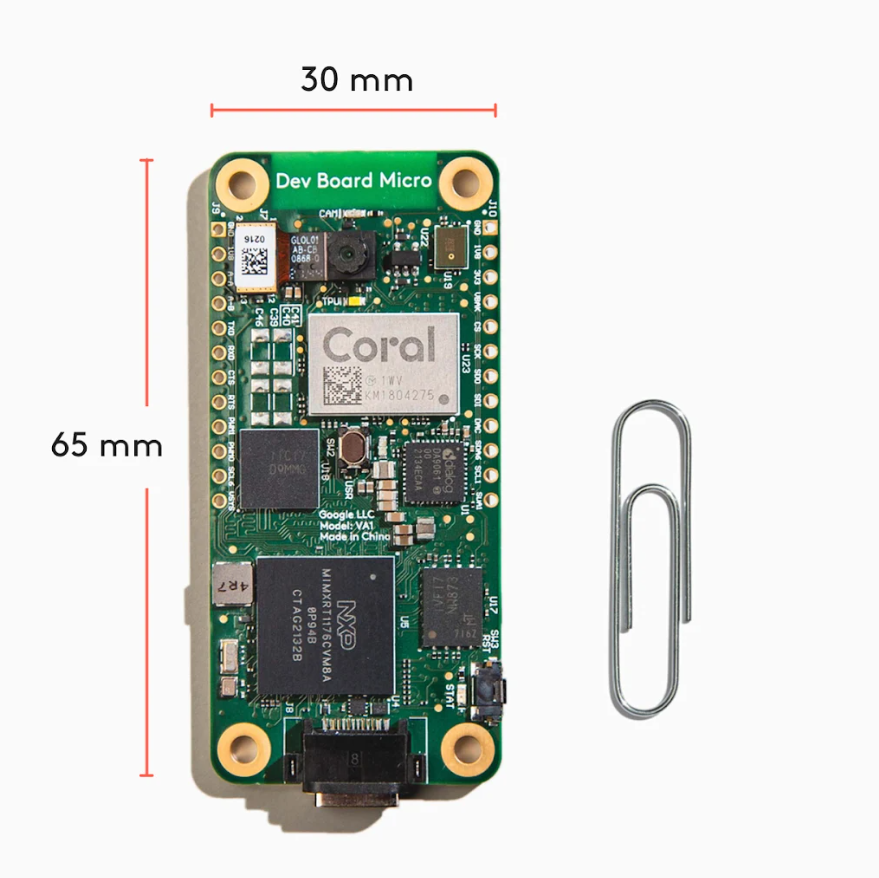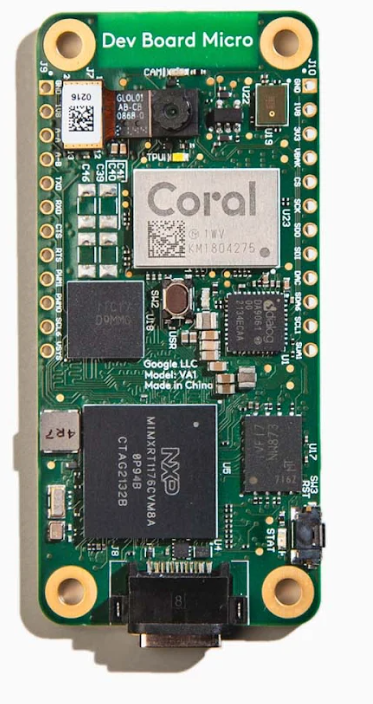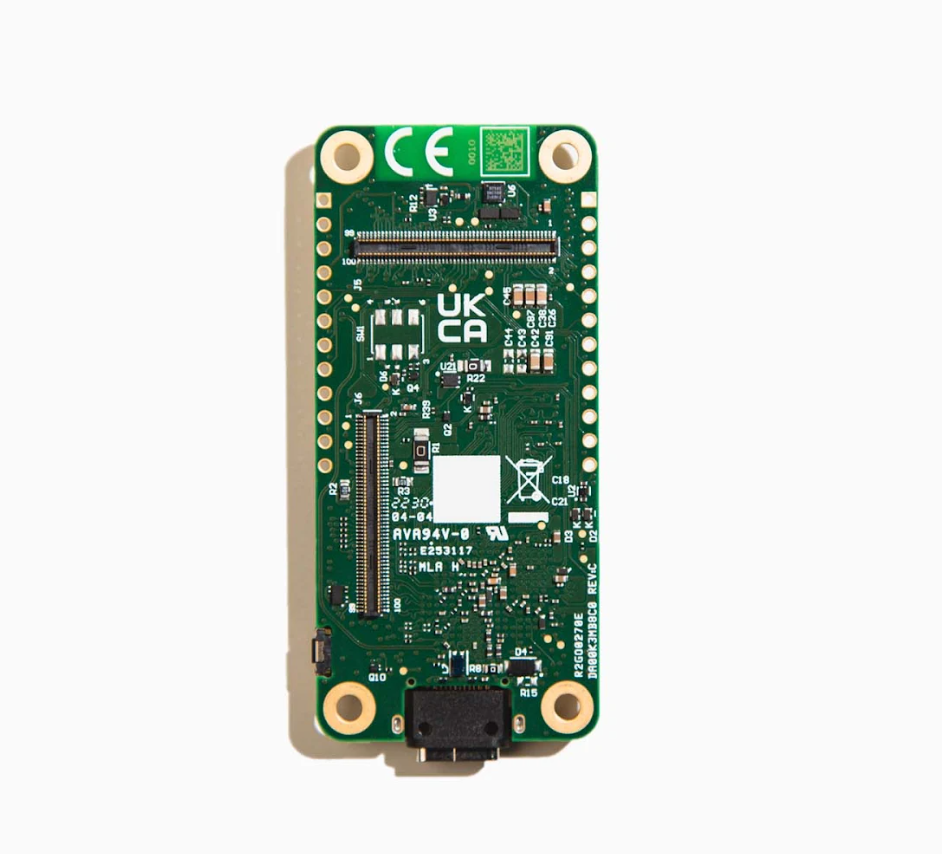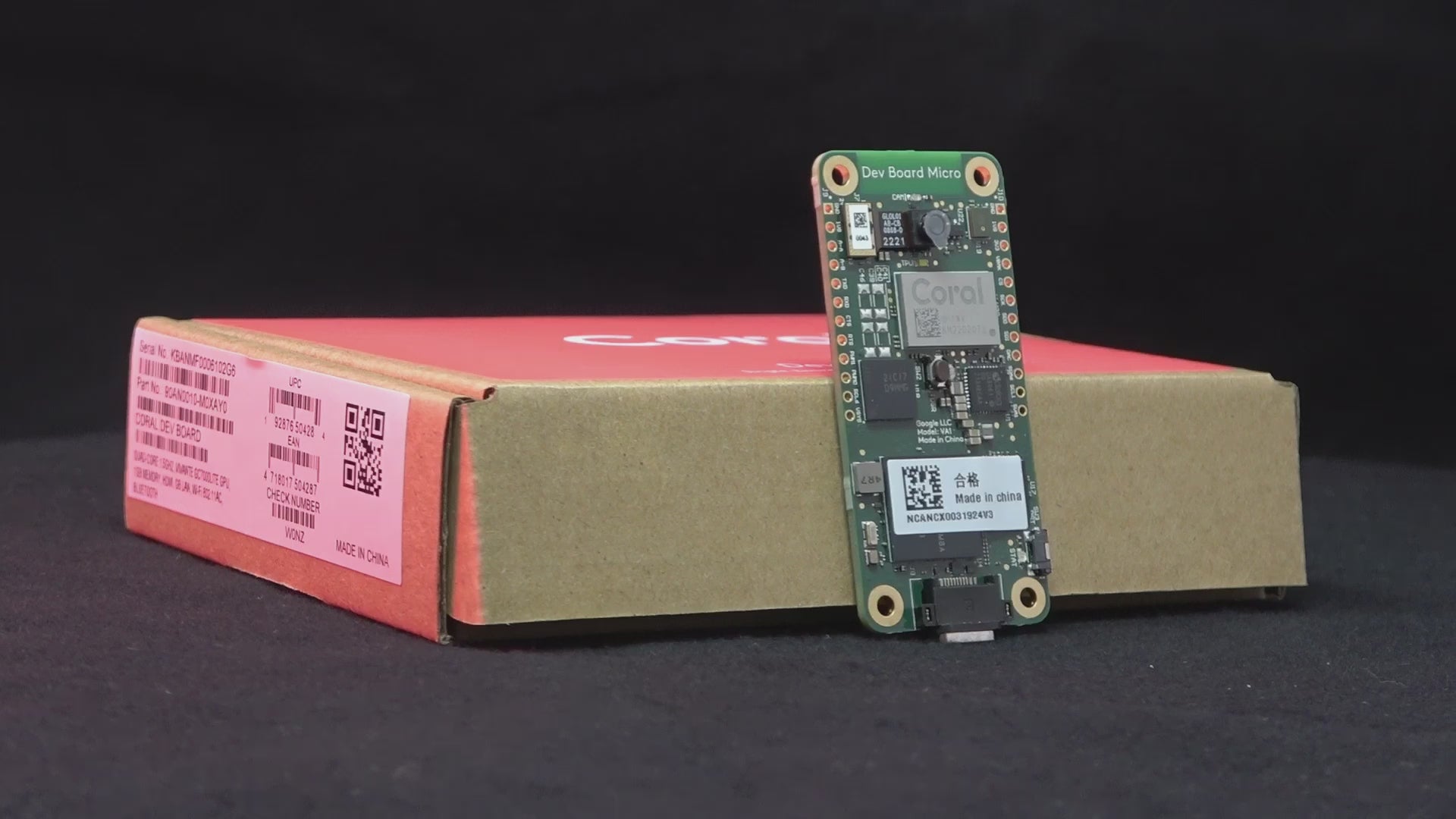Wichtiger Hinweis: Das Devboard Micro verwendet 1,8V Logikpegel - bitte stellen Sie sicher, dass Ihre Komponenten damit kompatibel sind, oder verwenden Sie Spannungspegelwandler!
Das Coral Dev Board Micro ist ein neues Produkt in der Coral-Reihe. Im Gegensatz zu den bisherigen SBC-Lösungen (wie dem Dev Board Mini) ist das Dev Board Micro ein Board, das auf einem Mikrocontroller basiert. Es verfügt über eine eingebaute Kamera, ein Mikrofon und - was am wichtigsten ist - die Coral Edge TPU, mit der Sie schnell Prototypen für stromsparende eingebettete Systeme mit On-Device-ML-Inferencing erstellen und einsetzen können.
Die auf diesem Board verwendete MCU, der NXP i.MX RT1176, hat zwei Prozessorkerne: einen leistungsstarken ARM Cortex-M7 und einen ARM Cortex-M4 mit geringerem Stromverbrauch. Beide CPU-Kerne unterstützen auch ML-Inferencing mit TensorFlow Lite für Mikrocontroller. In Kombination mit der Coral TPU können Sie so Systeme entwickeln, die von extrem stromsparenden ML-Inferencing zu komplexeren - aber immer noch stromsparenden - ML-Inferencing übergehen.
Sie könnten zum Beispiel ein kleines maschinelles Lernmodell ausführen. Dieses Modell bestimmt, unter welchen Bedingungen die Coral TPU aktiviert werden soll. Die Coral TPU wiederum könnte ein größeres, präziseres und leistungsfähigeres Modell für maschinelles Lernen ausführen. Sie wird nur dann aktiviert, wenn sie tatsächlich benötigt wird. Auf diese Weise kann Energie gespart werden, was für batteriegestützte Anwendungen, die im Feld eingesetzt werden, entscheidend ist.
Auf der Softwareseite erfolgt die Entwicklung für das Coral Dev Board Micro in C/C++. Das primäre Anwendungsframework für das Dev Board Micro ist FreeRTOS, aber Sie können auch Anwendungen mit der Arduino IDE erstellen. Die Coralmicro-Plattform unterstützt die zentrale Arduino-Programmiersprache für die Interaktion mit GPIO-Pins, Analog- und I2C-Pins usw. Für das Dev Board Micro gibt es auch benutzerdefinierte Arduino-APIs mit einer Arduino-ähnlichen Schnittstelle für Board-spezifische Aufgaben wie Mikrofoneingabe und Bildaufnahme von der eingebauten Kamera.
Beachten Sie, dass es sich bei diesem Board um ein mikrocontrollerbasiertes Board handelt, auf dem also keine Linux-Distributionen laufen, wie Sie es z.B. vom Dev Board 1GB gewohnt sind.
Das Coral Dev Board Micro hat auf jeder Seite zwei 12-polige unbestückte GPIO-Header. Für Hardware-Erweiterungen stehen zwei 100-polige Board-to-Board-Anschlüsse zur Verfügung, die zum Beispiel von der PoE-Zusatzplatine und der WiFi-Zusatzplatine genutzt werden (beide Zubehörteile sind separat erhältlich). Die Spezifikation für diese Anschlüsse ist offen, so dass Drittanbieter in der Lage sein werden, zusätzliche Erweiterungsplatinen für das Coral Dev Board Micro Ökosystem anzubieten.
Ein weiteres Zubehör, das Sie in Betracht ziehen könnten, ist das Gehäuseset, das passende Gehäuse für das Board allein oder zusammen mit dem PoE- oder WiFi-Zubehör enthält. Alternativ können Sie STEP-Modelldateien und STL-Dateien für ein 3D-druckbares Gehäuse auf der coral.ai Website herunterladen.
Technische Daten Dev board Micro
MCU
NXP i.MX RT1176: ARM Cortex-M7 @ 800 MHz und ARM Cortex-M4 @ 400 MHz
Beide Kerne unterstützen TensorFlow Lite für Mikrocontroller
ML-Beschleuniger
Coral Edge TPU ML-Beschleuniger: 4 TOPS Spitzenleistung (int8)
Verbunden mit der RT1176 MCU über eine USB 2.0 Schnittstelle
Andere Merkmale
- 64 MB SDRAM
- 128 MiB NAND-Flash-Speicher
- eingebaute flache Himax HM01B0 Farbkamera (324 x 324 px), Fixfokus
- eingebautes PDM-Mono-Mikrofon
- Secure Element NXP A71CH für kryptografische Geräteauthentifizierung und sichere Bereitstellung und Speicherung von Anmeldeinformationen
- 2 x 12-poliger GPIO-Anschluss (unbestückt), bietet GPIO, PWM, UART, I2C, SPI, DAC, ADC, GND, 3V3, 1V8 und VSYS
- 2x100-Pin-Anschlüsse, die verschiedene E/A der MCU für Zusatzplatinen bereitstellen: Coral Wireless Add-on und Coral PoE Add-on
- USB-C-Stecker für die Stromversorgung der Karte und USB2-Daten
- 4 on-board LEDs (alle LEDs sind programmierbar)
- 2 Taster (einer davon vom Benutzer für kurze Betätigungen programmierbar)
Abmessungen & Gewicht
0 × 30,0 × 6,8 mm
Gewicht: 10,4 g
Stromaufnahme
Hinweis: Das Dev Board Micro benötigt eine 5V DC-Stromversorgung, die 2 A liefern kann. Die Coral TPU kann während der Inferenz erhebliche Stromspitzen erzeugen, die das von Ihnen verwendete Netzteil verkraften muss.
Downloads & Dokumentation
- Dev Board Micro Datenblatt (PDF)
- Dev Board Micro Schaltpläne
- Erste Schritte mit dem Dev Board Micro
- API-Referenz (Coralmicro)
- API-Referenz (Arduino)
- Druckbares Dev Board Micro Gehäuse
Zusätzliche Informationen
Google Teilenummer: G650-07968-01
English Description
Google Coral Devboard Micro
Important note: the devboard micro uses 1.8V logic levels - please ensure your components are compatible with this, or use voltage level converters!
The Coral Dev Board Micro is a new product in the Coral range. Departing from the previous full-blown SBC solutions (such as Dev Board Mini), the Dev Board Micro is a board based on a microcontroller. It has a built-in camera, a microphone, and - most importantly - the Coral Edge TPU, allowing you to quickly prototype and deploy low-power embedded systems with on-device ML inferencing.
The MCU used on this board, the NXP i.MX RT1176, has two processor cores: one powerful ARM Cortex-M7 and a lower-power ARM Cortex-M4. Both CPU cores also support ML inferencing using TensorFlow Lite for Microcontrollers. This, in combination with the Coral TPU allows you to design systems that gracefully cascade from extreme low-power ML inferencing to more complex—yet still power-efficient—ML inferencing.
For example, you could run a small machine learning model. This model would determine under which conditions the Coral TPU would be activated. The Coral TPU in turn would run a bigger, more precise and powerful machine learning model. It would only be activated when actually needed. This way energy can be conserved, which is critical for battery-backed applications deployed in the field.
On the software side, the development for the Coral Dev Board Micro is done in C/C++. The primary application framework for the Dev Board Micro is FreeRTOS, but you can also build apps using the Arduino IDE. The coralmicro platform supports the core Arduino programming language, for interacting with GPIO pins, analog and I2C pins, etc. There are also custom Arduino APIs for the Dev Board Micro, sporting an Arduino-style interface for board-specific tasks such as microphone input and image capture from the built-in camera.
Note that this board is a microcontroller based board, so it will not run Linux distributions in the same way as you might be used to from the Dev Board 1GB, for example.
The Coral Dev Board Micro has two 12-pin unpopulated GPIO headers on each side. For hardware-add-ons, two 100-pin board-to-board connectors expose additional functionality, which is used for example by the PoE add-on board and the WiFi add-on board (both accessories are sold separately). The specification for these connectors is open, so third party vendors will be able to provide additional extension boards for the Coral Dev Board Micro ecosystem.
Another accessory you might want to consider is the case set, which has matching cases to house the board alone, or along with the PoE or WiFi accessory. Alternatively, you can download STEP model files and STL files for a 3D-printable case on the coral.ai website.
Technical Data Dev board Micro
MCU
NXP i.MX RT1176: ARM Cortex-M7 @ 800 MHz and ARM Cortex-M4 @ 400 MHz
Both cores support TensorFlow Lite for Microcontrollers
ML accelerator
Coral Edge TPU ML accelerator: 4 TOPS peak performance (int8)
Connected with the RT1176 MCU using a USB 2.0 interface
Other Features
- 64 MB SDRAM
- 128 MiB NAND flash memory
- built-in low-profile Himax HM01B0 color camera (324 x 324 px), fixed focus
- built-in PDM mono microphone
- Secure Element NXP A71CH for cryptographic device authentication and secure credentials provisioning and storage
- 2 x 12 pin GPIO header (unpopulated), provides GPIO, PWM, UART, I2C, SPI, DAC, ADC, GND, 3V3, 1V8 and VSYS
- High-density 2x100 pin connectors providing various I/O from the MCU for add-on boards: Coral Wireless Add-on and Coral PoE Add-on
- USB C plug for board power and USB2 data
- 4 on-board LEDs (all LEDs are programmable)
- 2 switch buttons (one user programmable for short presses)
Dimensions & Weight
- 0 × 30.0 × 6.8 mm
- Weight: 10.4 g
Power Requirements
Note: The Dev Board Micro requires a 5V DC power supply which can provide 2 A. The Coral TPU can produce significant power spikes during inferencing, which the power supply you use must be able to handle.
Downloads & Documentation
- Dev Board Micro datasheet (PDF)
- Dev Board Micro Schematics
- Get started with the Dev Board Micro
- API reference (coralmicro)
- API reference (Arduino)
- Printable Dev Board Micro case
Additional Information
Google part number: G650-07968-01
Sicherheitsangaben
- Lesen Sie die Bedienungsanleitung sorgfältig durch, bevor Sie das Produkt verwenden.
- Stellen Sie sicher, dass alle Montage- und Installationsanweisungen des Herstellers sorgfältig befolgt werden.
- Verwenden Sie das Produkt nur für den vorgesehenen Zweck.
- Die unsachgemäße Nutzung dieses Produkts kann zu schweren Verletzungen oder Sachschäden führen.
- Nicht für Kinder unter 10 Jahren geeignet.
- Bei unsachgemäßer Verwendung besteht eine Verletzungsgefahr.
- Dieses Produkt entspricht den geltenden Sicherheitsanforderungen der Europäischen Union.
- Dieses Produkt wurde gemäß der GPSR geprüft, die sicherstellt, dass alle relevanten Sicherheitsanforderungen für Konsumgüter eingehalten werden.
Nachverfolgbarkeitsinformationen
Jedes Produkt verfügt über eines oder mehrere der folgenden Merkmale:
- Ein CE-Kennzeichen, das die Einhaltung der Sicherheits-, Gesundheits- und Umweltschutzanforderungen der Europäischen Union anzeigt.
- Eine eindeutige Serien- oder Chargennummer, um die Nachverfolgbarkeit zu gewährleisten und bei Bedarf Rückrufaktionen zu unterstützen.
- Hersteller- und Importeurangaben für den Kundensupport und Sicherheitsanfragen.
Überwachung und Berichterstattung von Vorfällen
Für den unwahrscheinlichen Fall eines Produktproblems haben wir Verfahren implementiert, um:
- Kundenbeschwerden zeitnah bearbeiten.
- Schwerwiegende Vorfälle über das EU Safety Gate/RAPEX-System melden.
- Mit den Marktüberwachungsbehörden zusammenarbeiten, um die öffentliche Sicherheit zu gewährleisten.
Kontakt:
- Email: support [@] pi3g.com
- Telefon: 0341 / 392 858 40
Dieses Produkt ist vollständig mit allen geltenden EU-Vorschriften konform, um die Sicherheit unserer geschätzten Kunden zu gewährleisten.

